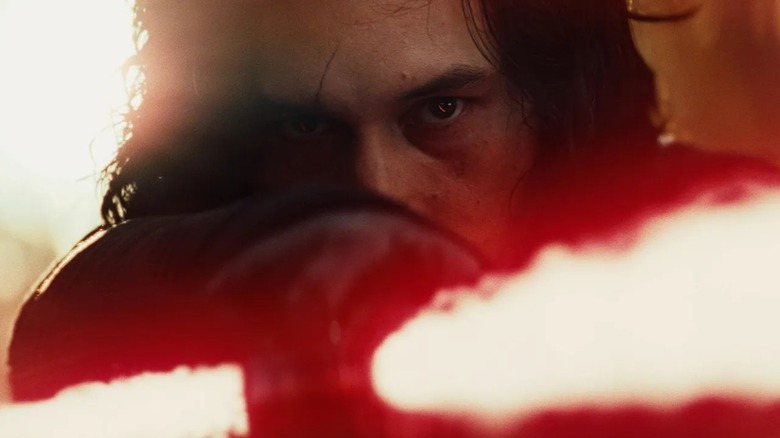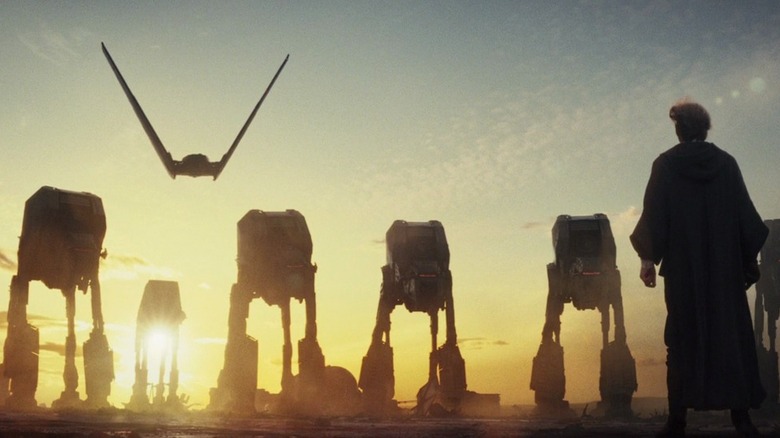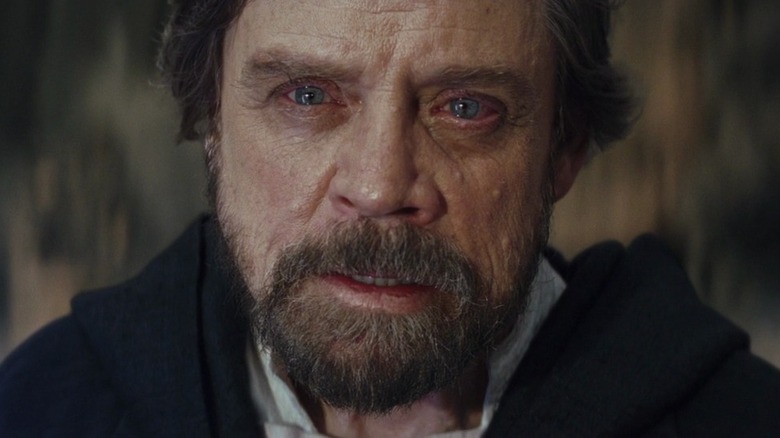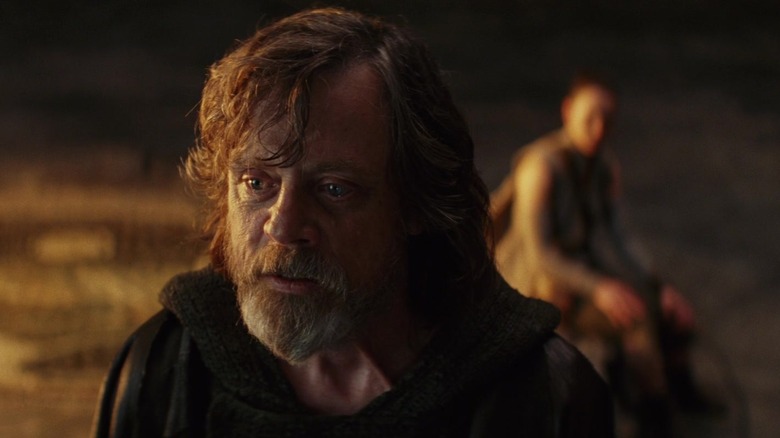Rian Johnson Is 'Even More Proud' Of Star Wars: The Last Jedi Now (As He Should Be)
Witnessing the spectacle of "Star Wars" through the eyes of a child is what movie magic is made of. I'll never forget the first time I was exposed to both the original trilogy and the prequels. Prior to being actively online, I thought they were supremely cool. I hold a more critical lens of them in retrospect, but it's difficult to ignore the artistry and craft that wowed me as a kid. There's always room for calculated criticism, but when it comes to "Star Wars," any discussion over one of these movies always takes us down the same predictable path.
Fewer fandoms have shown an uglier side to their disdain than that of the one that takes place a long time ago in a galaxy far, far away. For as long as "Star Wars" has existed, there have been a horde of toxic fans whose voices have been used to demean and harass series participants such as Kelly Marie Tran, Ahmed Best, Jake Lloyd and Hayden Christensen, but it feels like something shifted when "The Last Jedi" was unleashed upon the world.
Bullying is an unfortunate "Star Wars" tradition, after all. Almost every time "The Last Jedi" is trending in some way, it leads to a bevy of arguments, with director Rian Johnson comically propped up as a supervillain who supposedly ruined the original trilogy and "Star Wars" as a whole.
But like a pro, Johnson hasn't let the volatile reactions make him reconsider the artistry of a film that is not only one of the best examples of "Star Wars" media to date, but an excellent piece of filmmaking.
The Last Jedi was always meant to be about the myth of Star Wars
While promoting the upcoming release of "Glass Onion" for Empire, Johnson reflected on the legacy of "The Last Jedi." Over five years detached from the film's theatrical release, he still considers himself very proud of the finished result, as he should be. "When I was up at bat, I really swung at the ball," says Johnson.
The "Knives Out" filmmaker spoke to the existence of "The Last Jedi" as not only a fun space adventure, but a mythologic introspection that gets to the heart of "Star Wars":
"I think it's impossible for any of us to approach Star Wars without thinking about it as a myth that we were raised with, and how that myth, that story, baked itself into us and affected us [...] The ultimate intent was not to strip away – the intent was to get to the basic, fundamental power of myth. And ultimately I hope the film is an affirmation of the power of the myth of Star Wars in our lives."
"The Last Jedi" speaks exactly to what Johnson is talking about here. It's a grand, mythical piece of filmmaking that dares to challenge our perceptions about the characters and iconography that have dominated pop culture for decades. I really enjoy the blend of new and old that "The Force Awakens" brought to the table, but Johnson's interpretation made me think about this series in ways I hadn't before, and that's a good thing.
Rian Johnson only made Luke Skywalker more interesting
A common complaint I've seen lobbied against "The Last Jedi" is that it's a betrayal to Luke and all that he stood for. Johnson doesn't exactly see his film as a deconstruction of Mark Hamill's Luke Skywalker, but an extension of him. He goes on to mention how the character's final moments are about reflecting on the past to make way for a better future (via Empire):
"They're him absolutely defying the notion of, 'Throw away the past,' and embracing what actually matters about his myth and what's going to inspire the next generation. So for me, the process of stripping away is always in the interest of getting to something essential that really matters."
It's a vital lesson for children to learn. Your heroes will never be the saints you've built up in your heads, and that's okay. Even the most revered folks are allowed to grow from their mistakes. Luke is a character that has always grappled with the dark side. If Vader didn't intervene in "Return of the Jedi," he would have slayed the Emperor, and if the Emperor hadn't been there to whisper in his ear, he most likely would have slain Vader as well. Even in the final moments of "The Force Awakens," he doesn't exactly look too thrilled by the sight of his lightsaber.
The conflicting nature brewing within Luke is what makes him interesting, and Johnson got to the heart of this. I assure you, Johnson is not some boogeyman who meticulously pitched a whole movie to Lucasfilm so he could break into your house and snap your Luke action figure in half.
The Last Jedi feels like a last gasp of introspective filmmaking under Star Wars (that's a bad thing)
Our media is often more interesting, for better or worse, when it lies in the hands of a team of artists, rather than dictating what the fans want. It also helps that Johnson's direction, in conjunction with "Brick" cinematographer Steve Yedlin, lends itself to a visually striking epic that is easily the most beautiful "Star Wars" has ever looked.
"The Last Jedi" exists as an example of the magic that can happen when artists are allowed to thrive in a pre-established world. It does stand out, and that's why it will live on in the retrospection of "Star Wars" as one of the greats. The volatile reactions to "The Last Jedi" pretty much led to peddling back with "The Rise of Skywalker," a lackluster film that, in trying to please everybody, ultimately pleases no one. No risks were taken and where's the fun in that?
Johnson showed a brave ingenuity with a film that dared stand out among the homogenized factory associated with the modern blockbuster, and it's a shame he'll have to wait too long to realize the extent of how right on the money he was. With talks of his proposed trilogy still floating around Lucasfilm, the question has shifted from whether it happens to if we even deserve it.
"Star Wars: The Last Jedi" is currently streaming on Disney+.



